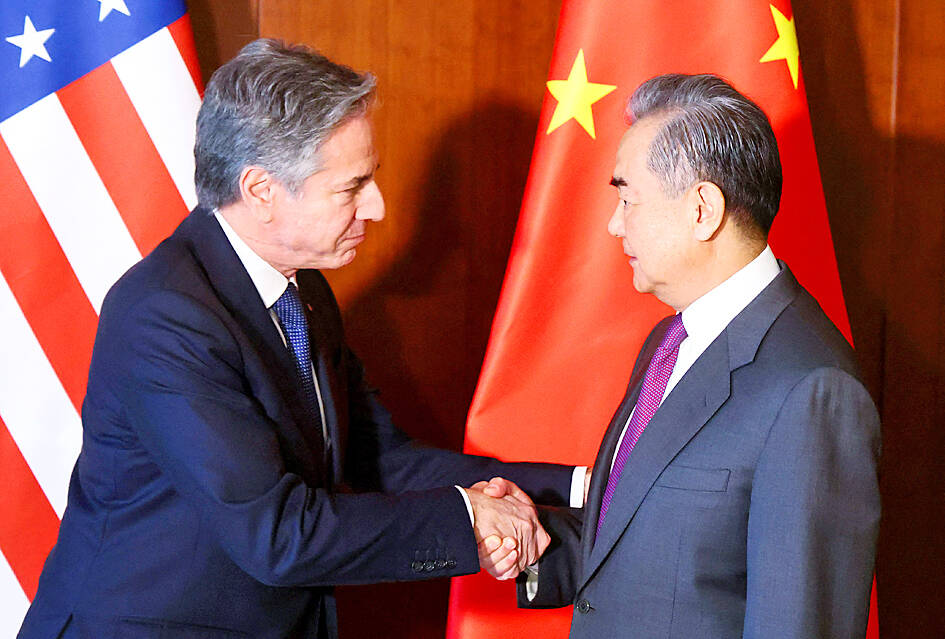Top diplomats from the US and China on Friday held a “candid and constructive” discussion on issues vexing their strained relations over Taiwan and Russia’s war in Ukraine, the US Department of State said.
The meeting between US Secretary of State Antony Blinken and Chinese Minister of Foreign Affairs Wang Yi (王毅) on the sidelines of the Munich Security Conference in Germany marked the latest and highest-level meeting between the two sides since US President Joe Biden and Chinese President Xi Jinping (習近平) held talks late last year in California.
Blinken emphasized the importance of maintaining peace and stability across the Taiwan Strait and in the South China Sea, State Department spokesman Matthew Miller said.

Photo: AFP
He also raised concerns about China’s support for Russia’s defense industrial base that Washington sees as helping Moscow’s military operations against Ukraine, as well as the need to expand on nascent counternarcotics efforts, he said.
“The two sides had a candid and constructive discussion on a range of bilateral, regional and global issues as part of ongoing efforts to maintain open lines of communication and responsibly manage competition in the relationship,” Miller said.
The Chinese Ministry of Foreign Affairs said Wang called on the US to remove sanctions against Chinese companies and individuals.
Wang said that Washington’s policy of “derisking” economically from Beijing “has become ‘desinicizing,’ ‘building a tall fence’ and ‘de-coupling from China’” and “will come back to bite the US itself,” a ministry readout yesterday morning said.
He also called on the US to stop searches of Chinese nationals.
Chinese state media recently published reports of Chinese citizens being searched at the US border.
In one prominent case, a group of students led by their professor from Beijing Foreign Studies University were interrogated for three hours upon arriving at Chicago’s O’Hare International Airport, Xinhua news agency reported.
Wang affirmed that cooperation to combat the spread of fentanyl was going “positively” and would continue, as well as the agreement to keep military-to-military communications.
Both sides also discussed the Israel-Hamas war and the war in Ukraine.
Blinken “reiterated that the United States will stand up for our interests and values and those of our allies and partners,” Miller said.
The situations in the Middle East and with North Korea were also topics of conversation, he added.
“Both sides recognized the importance of maintaining open lines of communication between the United States and [China] across a range of strategic issues, including consultations and high-level meetings in key areas in the coming months,” he said.
Additional reporting by AFP

TRAGEDY STRIKES TAIPEI: The suspect died after falling off a building after he threw smoke grenades into Taipei Main Station and went on a killing spree in Zhongshan A 27-year-old suspect allegedly threw smoke grenades in Taipei Main Station and then proceeded to Zhongshan MRT Station in a random killing spree that resulted in the death of the suspect and two other civilians, and seven injured, including one in critical condition, as of press time last night. The suspect, identified as a man surnamed Chang Wen (張文), allegedly began the attack at Taipei Main Station, the Taipei Fire Department said, adding that it received a report at 5:24pm that smoke grenades had been thrown in the station. One man in his 50s was rushed to hospital after a cardiac arrest

A car bomb killed a senior Russian general in southern Moscow yesterday morning, the latest high-profile army figure to be blown up in a blast that came just hours after Russian and Ukrainian delegates held separate talks in Miami on a plan to end the war. Kyiv has not commented on the incident, but Russian investigators said they were probing whether the blast was “linked” to “Ukrainian special forces.” The attack was similar to other assassinations of generals and pro-war figures that have either been claimed, or are widely believed to have been orchestrated, by Ukraine. Russian Lieutenant General Fanil Sarvarov, 56, head

SAFETY FIRST: Double the number of police were deployed at the Taipei Marathon, while other cities released plans to bolster public event safety Authorities across Taiwan have stepped up security measures ahead of Christmas and New Year events, following a knife and smoke bomb attack in Taipei on Friday that left four people dead and 11 injured. In a bid to prevent potential copycat incidents, police deployments have been expanded for large gatherings, transport hubs, and other crowded public spaces, according to official statements from police and city authorities. Taipei Mayor Chiang Wan-an (蔣萬安) said the city has “comprehensively raised security readiness” in crowded areas, increased police deployments with armed officers, and intensified patrols during weekends and nighttime hours. For large-scale events, security checkpoints and explosives

PUBLIC SAFETY: The premier said that security would be tightened in transport hubs, while President Lai commended the public for their bravery The government is to deploy more police, including rapid response units, in crowded public areas to ensure a swift response to any threats, President William Lai (賴清德) said yesterday after a knife attack killed three people and injured 11 in Taipei the previous day. Lai made the remarks following a briefing by the National Police Agency on the progress of the investigation, saying that the attack underscored the importance of cooperation in public security between the central and local governments. The attack unfolded in the early evening on Friday around Taipei Main Station’s M7 exit and later near the Taipei MRT’s Zhongshan